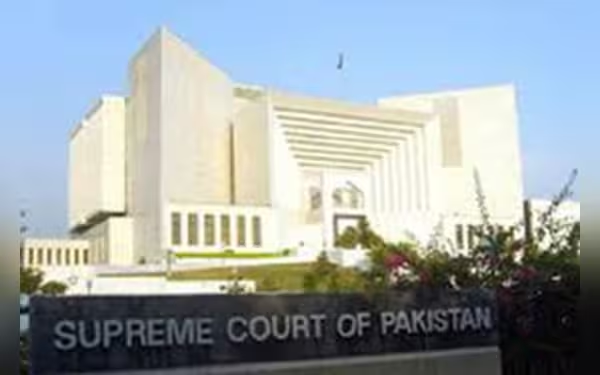Saturday, November 16, 2024 07:55 PM
Supreme Court Rules Against ECP's Unlawful Actions Impacting PTI
- Supreme Court emphasizes electoral integrity and political rights.
- Judicial intervention necessary for fair elections.
- ECP's unlawful actions harm democratic representation.
 Image Credits: nation_pk
Image Credits: nation_pkSupreme Court of Pakistan rules against ECP's unlawful actions affecting PTI, emphasizing the need for electoral integrity and fair representation.
The Supreme Court of Pakistan has recently delivered a significant verdict regarding the rights of political parties and the integrity of the electoral process. This ruling comes in the wake of concerns surrounding the actions of the Election Commission of Pakistan (ECP), which were deemed unlawful and detrimental to the democratic framework of the country. The case specifically addressed the reserved seats for women and non-Muslims in the National and Provincial Assemblies, highlighting the importance of fair representation in governance.
In a detailed 70-page judgment, the Supreme Court emphasized that the right to contest elections as a political party is a fundamental right guaranteed by Article 17(2) of the Constitution. This article underscores the necessity for political participation, which is essential for a functioning democracy. The Court pointed out that the ECP is not merely an administrative body; it serves as a guardian of electoral integrity and the legitimacy of democracy itself. When the ECP engages in actions that undermine these principles, such as unlawfully denying recognition to a major political party, it not only infringes upon the rights of candidates but also compromises the rights of the electorate.
The judges articulated that judicial intervention is crucial when the ECP makes significant errors that impact the electoral process. They stressed that the judiciary's primary role is to preserve the will of the people, ensuring that elections are conducted fairly and without corruption. Unlike ordinary civil disputes, election cases involve substantial public interest, as they affect the entire constituency rather than just the parties involved. This distinction is vital, as it highlights the judiciary's responsibility to protect the electorate's right to fair representation.
The Supreme Court further noted that the process of free and fair elections requires vigilant judicial monitoring. Courts must address any unlawful behavior in the electoral process, as their inaction could undermine the legitimacy of the elections. The judgment reiterated that the primary obligation of the courts is to safeguard the electorate's interests, ensuring that only candidates who have legitimately earned the support of the public assume office.
Moreover, the Court pointed out that the fundamental rights enshrined in Articles 17(2) and 19 of the Constitution are crucial for political participation and freedom of expression. These rights are essential for the electorate to influence government formation through their votes. The judgment emphasized that penal actions must be based on clear legal provisions, and courts should not stretch the meaning of laws to fit particular cases.
The Supreme Court's ruling serves as a reminder of the importance of electoral integrity and the protection of democratic rights in Pakistan. It reinforces the idea that every citizen's voice matters and that the electoral process must be free from corruption and bias. As the country moves forward, it is imperative for all stakeholders, including the ECP, political parties, and the judiciary, to work collaboratively to uphold the principles of democracy and ensure that the rights of the electorate are respected and protected.













